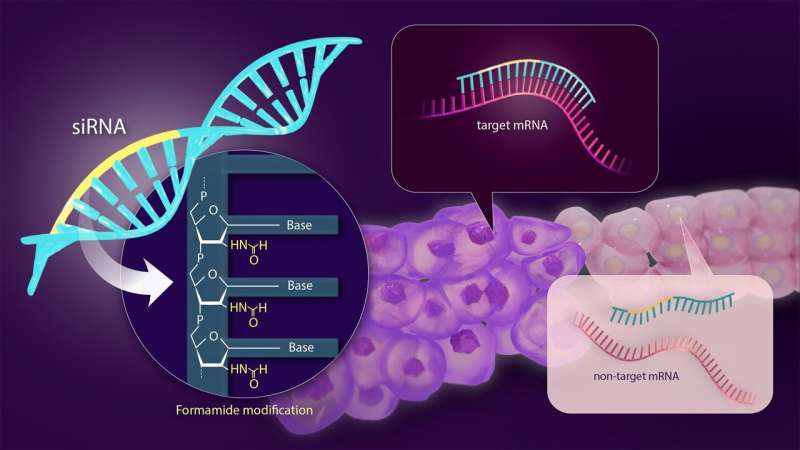
Small interfering RNA (siRNA) drugs are a class of therapeutic agents that silence specific genes associated with inherited diseases. However, siRNA drugs have challenges because siRNAs often silence genes other than the target ones, causing side effects.
Using formamide, a group from Nagoya University in Japan has succeeded in chemically altering siRNA to reduce the risks of these off-target effects, improving the safety of siRNA drugs for genetic therapy. The results were published in Nucleic Acids Research.
siRNAs are short, double-stranded RNAs. siRNAs interact with the target’s messenger RNA (mRNA), the blueprint of proteins, hindering their expression. By silencing the products of harmful genes, such as disease-causing proteins, siRNAs are a potential treatment for a range of genetic diseases.
However, siRNA’s therapeutic potential is limited by off-target effects, which occur when the siRNAs interact with non-target mRNA strands. These unintended interactions can lead to harmful alterations in essential genes, disrupting cellular processes and impairing the immune response.
A significant cause of these off-target effects is a seven-nucleotide region known as the seed region, located within the guide strand of the siRNA, which is critical for target recognition. Off-target effects frequently occur because the seed region sequence forms base pairs with non-target mRNA strands.
“The off-target effect likely occurs when non-target mRNAs exist that form base pairs with the seed region of siRNA,” Professor Hiroshi Abe explained. “We realized that the off-target effect could be suppressed by reducing the base pairing ability or double-strand stability in this seed region using chemical modification, ensuring that a stable complex is formed only when the entire guide strand binds to the target mRNA.”
The group led by Professor Abe and his student Kohei Nomura used a formamide modification to modify the siRNA in this important region. Formamide groups can inhibit the formation of hydrogen bonds.
In mRNA, hydrogen bonds between complementary bases are essential for the stability of the double helix. Formamide interferes with these hydrogen bonds, leading to destabilization of the helical structure of the mRNA, causing denaturation or separation of the strands. Without strand formation, the binding to the seed region of siRNA is difficult, reducing the risk of off-target effects.
“This modification achieved suppression of off-target effects with higher efficiency than existing chemical modifications,” said Abe. “Introduction of the modification at a single location achieved the desired effect, enabling a highly flexible sequence design of siRNA.”
Chemically modified siRNAs using this modification are expected to be applied as siRNA drugs with fewer side effects. Nomura believes the research has potential applications as siRNA drugs for diseases such as hereditary transthyretin amyloidosis, acute hepatic porphyria, primary hyperoxaluria type 1, primary hypercholesterolemia, and mixed dyslipidemia.
More information:
Kohei Nomura et al, Synthesis of 2′-formamidonucleoside phosphoramidites for suppressing the seed-based off-target effects of siRNAs, Nucleic Acids Research (2024). DOI: 10.1093/nar/gkae741
Citation:
Solving the side effect problem of siRNA drugs for genetic disease treatment (2024, September 6)
retrieved 7 September 2024
from https://phys.org/news/2024-09-side-effect-problem-sirna-drugs.html
This document is subject to copyright. Apart from any fair dealing for the purpose of private study or research, no
part may be reproduced without the written permission. The content is provided for information purposes only.







